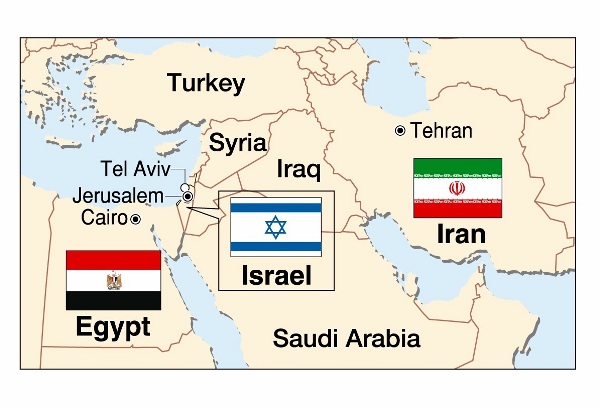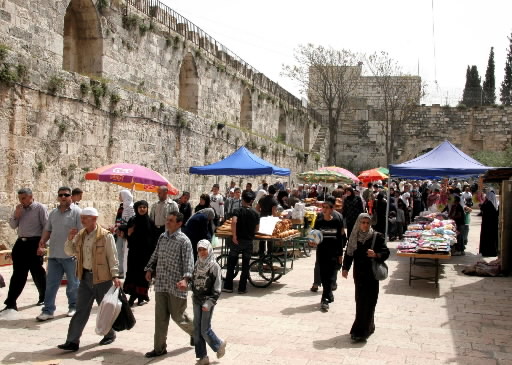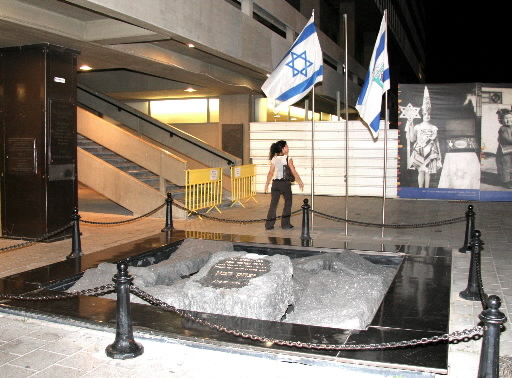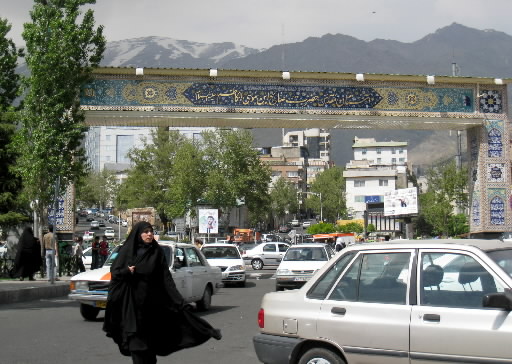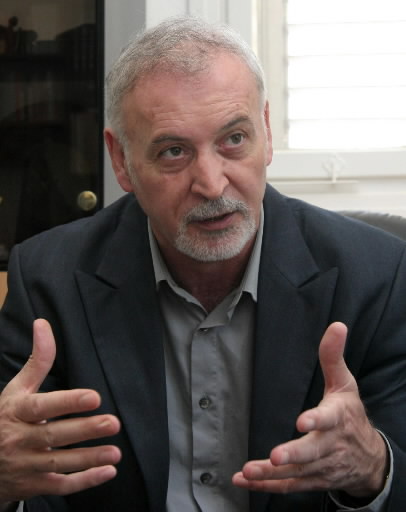Nuclear Weapons Can Be Eliminated: Chapter 10, Introduction
May 12, 2010
Chapter 10: The Middle East, Flash Point of the World
Introduction: Can denuclearization in the Middle East be realized?
by Keisuke Yoshihara, Staff Writer
Nuclear issues involving the Middle East will be a major item on the agenda at the Nuclear Non-proliferation Treaty (NPT) Review Conference. A personal visit to the region -- in my case, Israel, Iran, and Egypt -- makes one realize that the citizens of these nations seek to live in peace and voices calling for war are not heard. The history and balance of power in the region, however, makes clear that political conditions can lead to the de facto possession of nuclear weapons and suspected nuclear development programs. The key to realizing a Middle East that is free of nuclear weapons lies in addressing such conditions.
Israel: Rekindling tensions with Arab nations
Located about 50 kilometers west of the capital of Jerusalem, Tel Aviv is a city with European influence in its architectural styles and other aspects of daily life, as well as home to the embassies of various nations. People relax on beaches and walk down the street with ready smiles. Seeing such scenes makes one nearly forget that the nation is a flash point in the Middle East.
But in the city center is the site where Yitzhak Rabin, then prime minister of Israel, was assassinated in November 1995. And along the coast of Tel Aviv, also known as a resort town, stands a memorial with the names of 18 people who were killed in a terrorist attack in June 2001.
Men and women, drafted into military uniform, patrol throughout the city with rifles on their shoulders. Armed security guards stand at the entrances to restaurants and shopping centers. They maintain safety by checking the bags of all patrons. The international airport in Tel Aviv, located in a suburb, is also widely known for its stringent immigration control. Such circumstances suggest that the nation of Israel is always braced for war.
The Jewish people were landless until the Zionist movement sought to found a nation state in Palestine after fleeing from oppression in various locales. In May 1948, Israel declared its establishment as an independent nation. Arab nations reacted in opposition, and wars in the Middle East were waged four times.
Israel has since concluded peace treaties with Egypt and Jordan. But it still bears a contentious relationship with other Arab nations. Recently Israel has acted with stronger force toward Lebanon and Palestine, which is fueling frustration among Arab nations and rekindling tensions in the region.
Iran: Suspected nuclear development deepens rift with the international community
Tehran, the capital of Iran, lies at the foot of the Elburz Mountains, still frosted with winter snow. The site of the November 1979 hostage crisis at the U.S. Embassy is now used by the Revolutionary Guard, one of the military arms of Iran.
At the entrance to the facility are the words "DOWN WITH THE USA." A picture, deforming the face of the Statue of Liberty into that of a devil, has also been drawn on the wall. Another building used by the government bears on a side wall the image of the American flag composed of skulls and bombs.
At the same time, it is said that the local people feel longing for the United States. Naomi Shimizu, 42, a lecturer in Japanese in the Faculty of Foreign Languages at the University of Tehran, said, "If asked to which country they would want to emigrate, the people of Iran will mention the United States more than any other nation. At heart, the Iranian people are not warlike and they don't see the need for nuclear weapons. The impression that they are belligerent and anti-U.S. stems from some of the nation's politicians."
Suspicion over Iran's nuclear development activity emerged in August 2002 when members of dissident organizations revealed that Iran was constructing nuclear-related facilities, including uranium enrichment plants, in secret. At the end of 2007, the United States was told that Iran had frozen its nuclear weapons development program since the autumn of 2003, but trust between Iran and the United Nations Security Council and the International Atomic Energy Agency (IAEA) has been shaken.
This past April, the United States released its Nuclear Posture Review (NPR) and hinted at the option of using nuclear weapons against Iran, as well as North Korea. It is unlikely that the pattern of discord between the two nations will change as long as the Ahmadinejad administration, which pushes an anti-U.S. posture, is maintained.
Egypt: Appealing for a region free of weapons of mass destruction since the 1970s
Roughly 90 percent of Egyptian land is occupied by desert. Sprawling by the Nile River, the capital of Cairo is plagued by gridlock with a procession of cars incessantly honking their horns. Amid such disorder, pedestrians thread their way along the roads.
Although known as "a mighty Middle Eastern nation," Egypt now suffers from high prices and a high rate of unemployment, the consequence of worsening economic conditions. The average annual salary of public employees is reportedly as little as 200,000 yen.
In 1974, Egypt submitted a resolution aimed at the denuclearization of the Middle East at the U.N. General Assembly. But unless the de facto nuclear possession by Israel is resolved in some way, its realization cannot be expected. In April 1990, as well, President Hosni Mubarak proposed creating a Middle East free of weapons of mass destruction, including nuclear weapons.
Some feel Egypt, in persistently maintaining that Israel's nuclear possession be taken up as an item on the agenda of the previous Nuclear Non-proliferation Treaty (NPT) Review Conference in 2005, played a contributing role in the fact that the conference broke down without producing a final agreement. At this year's NPT Review Conference, Egypt is again anticipated to highlight the importance of pursuing measures to achieve a zone free of weapons of mass destruction in the Middle East and urge that international pressure be directed toward Israel.
Interview with Issam Makhoul, former member of the Israeli Parliament: Discussions should benefit the world as a whole
Issam Makhoul was the first member of the Israeli Parliament (Knesset) to take up the nuclear issue in the body's history. This was in February 2000. After retiring as a member of parliament, Mr. Makhoul has been studying such issues as peace in Palestine. The Chugoku Shimbun interviewed Mr. Makhoul on the state of affairs at that time and the future of his homeland.
Why did you take up the issue of nuclear weapons at the parliament?
Although some people were opposed to the possession of nuclear weapons, such opposition to the national policy had not yet been raised at the parliament. I believed it was vital to discuss the situation, have the media cover it, and have the public become aware of it.
I presented three points: First, regardless of the government's stance on the nuclear issue, if discussion is even avoided, this would be a contradiction of democracy itself. Second, the issue must also be seen as an environmental concern.
Third, the issue must be viewed from the perspectives of politics, military force, and security. This means that Israel's possession of nuclear weapons could lead to the ambitions of other nations to possess nuclear weapons. The nuclear facility of Natanz in Iran is not the reason Israel built its facility in Dimona. Dimona is the reason for Natanz.
Ten years have passed since then. Have you noticed any changes?
The notion that Israel's nuclear possession is necessary for its national security has taken root. At the same time, the sentiments of Israeli citizens have changed, due to the threat posed by Iran, and people are now more conscious of the problem.
Israel lies at the heart of the "nuclear peril," not only in the Middle East, but in the world as well. U.S. President Barack Obama criticizes Iran and North Korea, but does not mention Israel, which can be seen as an act of hypocrisy. Israel should be punished over the fact that it is not a signatory of the Nuclear Non-proliferation Treaty (NPT).
What are your thoughts on this year's NPT Review Conference?
The conference must resolve the "double standard" in which the conference participants are unable to mention the issue of Israel. Discussing Israel would benefit the world as a whole.
Would Israel renounce its nuclear weapons?
I believe the idea of turning the Middle East into a zone free of weapons of mass destruction will be endorsed by many nations, including Iran. But Israel will be hard-pressed to go along, since remaining the only nuclear power in the Middle East is ideal, in its own estimation.
I see one possibility in which this stance might change. It would be to stress the threat that other nations could come to possess nuclear weapons, too. Israel's neighbors must call on it to take reasonable steps toward the elimination of nuclear weapons in the Middle East. For this end, negotiations must be initiated now, instead of allowing a nuclear arms race in the region. The issue of nuclear weapons is not limited to such nations as the United States, Israel, or Japan. It is an issue for all of humanity.
Profile
Issam Makhoul
Mr. Makhoul was born in 1952 and was a member of Israeli Parliament (Knesset) from 1999 to 2006. He has been chair of the Emil Touma Institute for Palestinian & Israeli Studies, a private think tank, since 2007.
(Originally published on April 27, 2010)
To comment on this article, please click the link below. Comments will be moderated and posted in a timely fashion. Comments may also appear in the Chugoku Shimbun newspaper.

